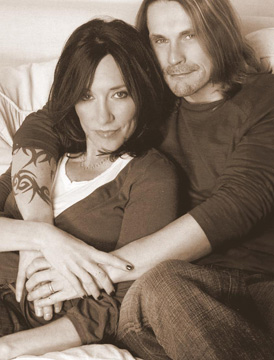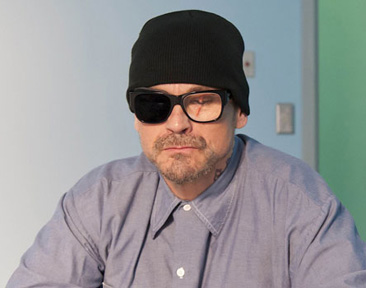
The season’s over and it was a really good one for Sons of Anarchy. A lot of new growth and some really fine work by a large percentage of the cast was slightly softened by a rather disappointing climax. Given the chance to have some time on a conference call with series creator Kurt Sutter, I was anxious to find out a little more how he approaches his craft and without a doubt his works and logic went a long way towards giving me a lot of faith in his motives and approach. As a result, I’m a bigger fan than I already was.
Long live the Sons.
 Nick Nunziata: You made an interesting comment in an interview about the above-the-line costs making it difficult to keep the show going after season seven. You’ve got such a flexible and loyal fan base, and the ratings keep getting better. How do you juxtapose that balance of commerce and art, and how’s it going to affect the way that you wrap up the next couple of years?
Nick Nunziata: You made an interesting comment in an interview about the above-the-line costs making it difficult to keep the show going after season seven. You’ve got such a flexible and loyal fan base, and the ratings keep getting better. How do you juxtapose that balance of commerce and art, and how’s it going to affect the way that you wrap up the next couple of years?
Kurt Sutter: It’s always the struggle in terms of—I’m very aware that I’m writing a show for TV, so I do want to write storylines that are rich and complex, and characters that are three-dimensional, and we do have actors that give tremendous performances.
But there’s an element of the show that’s incredible pulpy and that is very entertaining. And to me, that’s as important as the rich, deep character stuff. Because I’ve no desire to run a show that only a couple hundred thousand people watch. If I want that kind of audience, I’ll go do theater. And so it is important to me to keep the show fun and entertaining, and I think that’s what frustrates you guys sometimes is the combination of those things.
In terms of the fan base and seven seasons—I threw out the seven-season milestone just because that was my experience on The Shield in terms of when the above-the-line costs become too much. And I knew I could tell the story I wanted to tell in a seven-season arc. I’m hoping we manage to have that length of time to do that.
And if for some reason FX came to me or 20th came to me and said we can go two more seasons, I would have to get that information before episode #710 to figure that out. But I’d be open to exploring that.
Nick Nunziata: You’ve said that you don’t necessarily know where some things are going. Additionally, there’s a sense of unpredictability. And it’s so refreshing to see a creator willingly say, “This isn’t fully mapped out. This isn’t some intricate thing.” And I kind of wonder, do you constantly find yourself questioning things by performances by the way people react and by your own amazing group of character actors? Is it the kind of thing that you’re electrified by on a daily basis, or is it just a matter of you like to not have a net?
Kurt Sutter: No. I mean, I like nets. I don’t like to live dangerously. My process usually is I come in at the beginning of the season with a fairly in-depth skeleton of the bigger story arcs and where I want to go. For example, this season I knew everything we were doing with ‘Romeo’ and the CIA. I knew that that ultimately would be the thing that would force ‘Jax’ not to off ‘Clay,’ and that we were going to end the season with ‘Jax’ sitting at the head of that table. I knew those bigger story arcs at the beginning of the season.
And then, I sit down with my writers, and we go, obviously, episode by episode, and we hang the meat on the episodes with our stories and our narratives and our A stories and our B stories. And in that process as you write these stories, the narrative then forms the arcs, and things get tweaked and changed. And that’s part of the process.And then, we produce the show pretty tightly. So I’m seeing performances of actors as I’m writing episodes that are only a couple—as the season progresses, a little too close to when they will actually be shot. So I’m able to see what actors are able to bring to a role, and their interpretation.And then it continues to inform me about—especially our new actors. Especially our new characters like ‘Linc Potter’ and ‘Eli Roosevelt.’ They were two dimensional quite often when these characters began at the beginning of the season. And as my writers and I get in, we get to make them richer and develop them more, and then have really good actors that tend to inform of who they are so that usually halfway through the season, they’re three dimensional.
And a lot of that has to do with the actors and their performances. So it allows me to write to their choices more specifically. It’s not like we’re running loosey-goosey here and shooting from the hip. I do try to have a lot of structure going into the season. But what I’ve learned is that it really has to be a blueprint. I can’t lock into an idea or a theme or a story arc and then hold onto it too tightly because what happens is other things continue to inform it.
So I just have to be open to that process and allow things to change and things to tweak and things to go sometimes in a little different direction, and be open to making those changes. And I think that’s what helps keep the show fresh and hopefully compelling to watch.
Other highlights from the chat:
 Q: So, ‘Opie’ lost his wife and his father because of the club, and ‘Jax’ has lost his father; his son was kidnapped, and ‘Tara’ was injured. Why is it that these guys can stay so loyal to the club despite being—it seems to be bent on destroying them?
Q: So, ‘Opie’ lost his wife and his father because of the club, and ‘Jax’ has lost his father; his son was kidnapped, and ‘Tara’ was injured. Why is it that these guys can stay so loyal to the club despite being—it seems to be bent on destroying them?
Kurt Sutter: I think ultimately, as we’ve talked about with some of the characters—but I think it’s really for the most part it’s all these guys know. And for me it’s the crux of the drama—at least with ‘Jax’—is he was raised in this world, and it’s all he knows, and can he leave it? Can he abandon it? And if not, can he fix it?So for me, I know there were some questions in terms of what happened to ‘Opie’ at the end of the episode. It was just too neat and simple for ‘Opie’ to come back. ‘Opie’s’ a complicated dude, and one of the things that was fun this season with him is really—as I think it is with some of these guys, they’re not very self aware. It took marrying somebody else for him to actually begin to grieve the death of his wife. And so I think it’s just all catching up with ‘Opie.’ And he’s not a guy that processes things quickly. So in my mind, it’s going to take a minute for ‘Opie’ to get back to that table if he does get back. And it’s something we get to play out next season, but he’s not ready to necessarily be at ‘Jax’s’ left, especially with ‘Jax’ not being able to really be completely honest with him.
But just think it’s really all they know, and we get to explore that. And to be honest with you, if they decided it wasn’t what they want and left, I wouldn’t have a show left.
Q: My question to you is I feel like this season you were setting up a big death with either ‘Clay’ or with ‘Tara.’ And you have proven throughout all the seasons that you’re very unpredictable, so I guess it would’ve been a little bit too neat to kill one of them off in the season for now, but maybe you can share with me why you decided not to kill either one off?
 Kurt Sutter: As the stories developed, we got a sense that we—at least with ‘Tara’—weren’t going to kill ‘Tara.’ I’m all about surprising, and I have no problem killing off main characters. But I also have to, in some ways, protect the show. And I think it would be very difficult for us to continue with ‘Jax’ and tell that story without ‘Tara.’ And so I knew that that wasn’t going to happen.
Kurt Sutter: As the stories developed, we got a sense that we—at least with ‘Tara’—weren’t going to kill ‘Tara.’ I’m all about surprising, and I have no problem killing off main characters. But I also have to, in some ways, protect the show. And I think it would be very difficult for us to continue with ‘Jax’ and tell that story without ‘Tara.’ And so I knew that that wasn’t going to happen.
But for me, I just think death—whacking somebody—sometimes is just too easy, and you’ve got potential story—to me it’s a much more complex and interesting story to take away the thing that defined ‘Tara’—her being a healer. What happens when you take that away? Then where is ‘Tara’? What does she become?
Same thing with ‘Clay’—it would’ve been way too easy for ‘Jax’ to have that revealed about his father that we’ve been playing with for four seasons now and then to have ‘Jax’ kill ‘Clay’ two scenes later. To me, it’s a much more interesting turf for story to have that awareness and play that out for a couple of seasons.
I keep using this example, but it’s really what I’m stealing from is The Shield when we had ‘Vic’ become aware that ‘Shane’ was the one who killed ‘Lem.’ We had that awareness happen, and then we got to play that out for a season and a half where these guys loathed each other and wanted each other dead and felt this enormous sense of betrayal and yet had to suit up and go to work with each other every day living with this secret.And we get to play that out now with ‘Jax’ and ‘Clay.’ I just think that’s great turf for potent storytelling and what does that look like, and how do these guys interact? It would’ve just been too easy, and quite frankly, I want to see what that looks like for a season or two to have these guys aware of this now, rather than just have the reveal and have him avenge it. It’s really about just wanting to create more territory for story.
Q: I wanted to talk a little bit about the new external threat you set up with ‘Leroy’s’ dead girlfriend’s father. Do you think those kinds of external threats are going to take a backseat to the more focused internal threats in the club in the next season?
Kurt Sutter: I don’t know yet. For me, what I wanted to do is just—obviously I’m trying to be smart and give myself a running start for next season. I’ve learned that that really helps. It really benefits a show to be able to hit the ground running for a new season, so some of it is that.And also, some of it is really just creating some sense of the sword of Damocles hanging over ‘Jax’s’ head as he’s sitting at that table—that other than the internal conflict, the club is potentially facing a very dangerous foe because of their actions. So some of it was just from being able to have something hanging over ‘Jax’s’ head at the end there when he’s sitting at that table and having the audience aware of that, and he doesn’t quite know what he’s gotten himself into—so some of it was just throwing some complexity in there.
And I don’t know the level of threat yet. I’d love to be able to brand that character. In my mind, he’s sort of a Frank Lucas kind of a guy that has a lot of sway and is a few steps above the club in terms of influence and connections. I haven’t really given specific thought to what that conflict looks like and whether or not it will take precedence.
Obviously, the internal threats and the internal dynamics will continue with ‘Jax’ and ‘Clay’ and the rest of the club. My sense next season is that it’ll be a slower boil. It won’t quite be as fast and kinetic as this season was with the cartel and with ‘Jax’ wanting to get out. This season, everyone was out of breath at the end of every episode, and my sense is that next season that won’t be the case. It’ll just be a slower boil next season, if that makes sense.
Q: Congrats on the huge ratings in season four. What do you attribute that rise this season to? Obviously you guys had been doing amazingly well before, but does being the most popular show in FX history give you that much more latitude to push the creative envelope, or is John Landgraf still occasionally finding it necessary to reel you in?
Kurt Sutter: That’s a good question. Obviously it’s very satisfying, and I think it’s attributed to the fact that I surround myself with people who are way more talented than I am—and great actors. I think people have really come to understand these characters and plug in, and they’re along for the ride.I think Netflix helped a great deal. I think people watching the first couple seasons really allowed them to plug into the show and get it. And I can’t tell you the number of tweets and comments on Facebook about the new fans we got as a result of Netflix, so I think that was important to the rise.
And in terms of pushing the envelope, the nice thing is that the more I do this and the more I understand what the show is, the more the network understands what the show is. The notes I get are very sparse. Usually what’ll happen in the beginning of the season, there’ll be a lot more questions and a lot more comments and a lot more notes just to understand what we’re doing. And then as the episodes are delivered, the notes and the comments and the questions get fewer. And they’re really come to trust where I’m taking the show. So it’s a pretty good symbiotic relationship.
And yes, there will be times when I’ll have a conversation with John [Landgraf] about a thematic point or sometimes even just a piece of dialog, and we’ll have a conversation about it. But the good thing is I never get a, “Don’t do that.” I get a, “Why are you doing that? Can you explain it to me?” And what that’ll do is often it’ll force me to take a step back and look at things and try to look at it from a different point of view, which I think as an artist that it’s really valuable.
I don’t loathe notes, as hard as they are to hear sometimes. I’ve just learned that ultimately when I’m forced to look at it from somebody else’s perspective, it gives me insight. And what usually happens out of that process is the best solution comes out of that. So whether it’s from the network or my writers or a director, I find that process very valuable.
Q: I wanted to ask about your character, ‘Otto.’ It’s always interesting when he shows up. And can you talk about the evolution of that character over the years, and is his story done?
Kurt Sutter: For me, the character was really a device initially that a lot of these guys are inside and not a lot of information and intel. And a lot of the club dynamics often generate from prisons. And it was really just a device to get some exposition, quite honestly. It’s been fun metaphorically to continue to abuse this guy.
And then I had this story line, obviously, this season that came up with RICO. And then we sort of took a look at everything ‘Otto’ had done, and I started putting together in my head the specifics of his back story. And it wasn’t until this season that ‘Otto’ really—for me as a writer—became three-dimensional and really looked at all the … that’s happened to him. And we get a little piece of that when he gives ‘Bobby’ the list in episode 12.You have a guy who two years ago would be willing to bounce a Fed’s head off the table for the club, and now he feels this deep sense of betrayal and know that he’s done. And in true Outlaw fashion, he’s going to take everybody down with him.
For me, it was sort of fun to give him another dimension this season. And as an actor, it’s fun to do. I’m clearly the only one who will hire me as an actor. And I don’t know if he’s done. He’s clearly not going to be a resource for the club anymore, and they’re expediting his execution. Our season’s timelines are usually fast, so we could play that out for a couple of seasons.I’m sure we’ll see ‘Otto’ again. I don’t know what that will look like currently though.
Q: My question was, I know that the play Hamlet is sort of the basis for a lot of this, and I was wondering how that works in terms of the writing process and how strictly you feel you need to keep to it? And is it just sort of an inspirational thing and you take it wherever you want, or how does that work?
Kurt Sutter: It doesn’t figure into the writing of the show. It’s not like we have the play up on a board with plot points that we try to follow. I think it really more speaks to tone and the operatic nature of the show and the pulpiness of the show—the epic quality that some of the storylines have. And the archetypes, obviously, with ‘Clay’ and ‘Jax’ and ‘Gemma’ and ‘Tara’ are there.There are often some overlaps, I think, in terms of theme and story that I try to do. And obviously my absurd little wink at all of that with the title of these last two episodes, and just in ‘Jax’ making that decision of what he was going to do. And I don’t know how that’ll play out in the future. I’m sure I will continue to have the show resonate off of those themes somewhat. Whether or not they all end up dead in a big puddle of blood at the end of the series is yet to be determined.